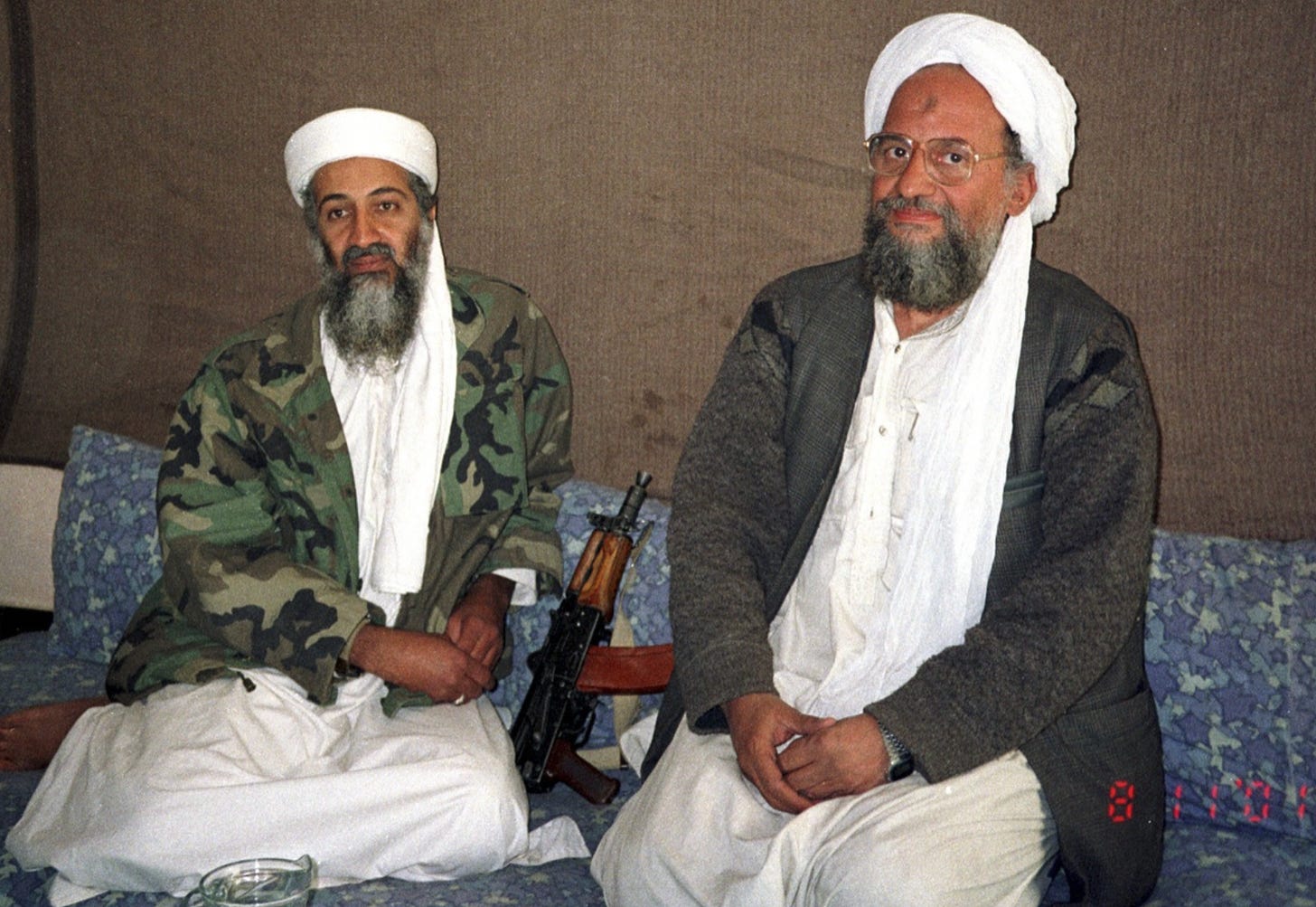
The Last Original High-Value Target
Killing al Qaeda leader Ayman al Zawahiri provides a bookend for 9/11
U.S. President Joe Biden said on Monday that American forces killed al Qaeda head Ayman al Zawahiri. Biden is now the fourth American president in a row to give a televised address announcing the death of a terrorist leader.
The U.S. drone strike was in Kabul, the first in Afghanistan since American forces finished withdrawing eleven months ago. Reportedly, it wasn’t the U.S. military, though American officials wouldn’t say more, which almost certainly means it was the CIA. The strike shows that terrorists have greater freedom of movement in Afghanistan under the Taliban, as opponents of withdrawal feared, but also that the United States retains the ability to track and kill there. The Taliban and any terrorist groups in the country, such as ISIS-K, surely noticed. However, it likely does not represent a full resumption of the American drone campaign, which Biden mostly suspended.
Zawahiri was a founder of al Qaeda, an intellectual godfather of its version of jihadism, and the organization’s leader after an American special operations ground raid killed Osama bin Laden in 2011. An Egyptian doctor, Zawahiri embraced radical politics as a teenager, founded Egyptian Islamic Jihad, and spent time in jail as a political prisoner. He admired the Egyptian jihadist Sayyid Qutb, and advocated Qutb’s vision of offensive operations against apostate (i.e. insufficiently religious) Muslim governments.
That’s the philosophy he brought to al Qaeda as one of the founders in 1988. Zawahiri clashed with another founder, Abdullah Azzam, who argued that jihad was fundamentally defensive. A year later Azzam was dead, and while his killer was unknown, many suspect Zawahiri. But no matter who killed Azzam, Zawahiri’s vision of offensive jihad won out, and bin Laden took it global by arguing that al Qaeda couldn’t defeat the “near enemy”—the apostate governments in Egypt, Saudi Arabia, etc. as well as Israel—without first getting the “far enemy” (the United States) to stop supporting them.
That led to a series of deadly attacks against American targets: the embassy bombings in Kenya and Tanzania (1998), the strike on the USS Cole off the coast of Yemen (2000)—the deadliest attack on the U.S. Navy since WWII—and the September 11th attacks on the Twin Towers and the Pentagon (2001).
Zawahiri helped form and run al Qaeda's franchise-like structure. In 2005, he wrote a letter to al Qaeda in Iraq leader Abu Musab al Zarqawi telling him to stop beheading prisoners on camera, especially other Muslims. It reads like a corporate executive scolding a local franchise owner to stop damaging the brand. (Zarqawi mostly ignored the request, and his Iraqi group subsequently grew into ISIS.)
While smart, Zawahiri famously lacked bin Laden's personal and public appeal. In a memorable—and as far as I know accurate—burn, terrorism analyst Peter Bergen, who has interviewed al Qaeda members, called Zawahiri a "black hole of charisma."
The United States and others have been hunting Zawahiri for decades. He was the last of the original high-value War on Terror targets still at large. Khalid Sheikh Mohammed, the principal architect of 9/11, was captured by a joint U.S.-Pakistani operation in 2003 (he's still in American custody). A Navy Seal operation in Pakistan killed bin Laden in 2011. Now a U.S. drone strike killed Zawahiri in Afghanistan.
However, while Zawahiri’s death will be disruptive to al Qaeda, what it does to the terrorist group’s operations remains to be seen.
Killing Zawahiri is a milestone in the fight against jihadists, but the threat of terrorism isn't over, and in some ways never will be. Al Qaeda still exists, as does ISIS—which is probably more dangerous at this point—and over the last decade, more Americans have been killed by far right terrorists than by jihadists. The challenges of counterterrorism remain. But the post-9/11 War on Terror is effectively done.
Lastly, on a personal note not nearly as important as the above, I've been fixated on al Qaeda and jihadism since 9/11—as have many others—and have been teaching about the group every semester since 2007. It's been 21 years. The U.S. killing Zawahiri feels like a bookend.














